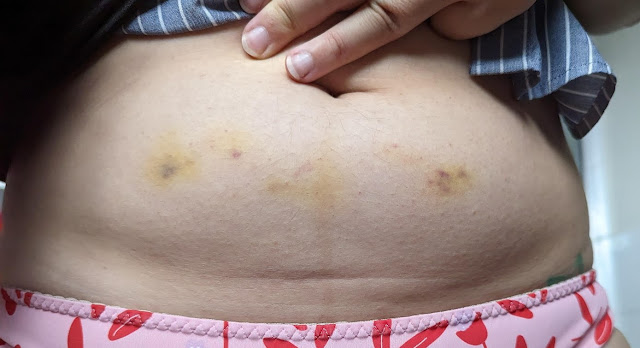Early pregnancy scans & tests
 |
| Our 2cm bean at 8 weeks. |
For someone trying to get pregnant for a number of years, I sure was oblivious to what pregnancy actually entails. I knew that you did an at-home pregnancy test and then should get a blood test to verify any positive results. And then...?
I went to my regular general practitioner doctor (GP). He is very considerate and attentive when diagnosing general health problems but he is not an antenatal specialist so wasn't across the nuances of early pregnancy. I've since come across a checklist that would have been handy for both of us to know and work through together.
I am in Queensland, Australia and at my first public hospital midwife appointment, I was given a printed version of the Pregnancy Health Record and told to take it to every medical appointment from now on. Pages 12 to 13 are a handy breakdown of what you'll be chatting to healthcare professionals about during the different weeks of pregnancy. https://clinicalexcellence.qld.gov.au/sites/default/files/docs/clinical-pathways/pregnancy-health-record.pdf
A summary of my pregnancy scans and tests up to Week 20 (the halfway mark!):
Blood test to verify pregnancy.
Blood test to check immunities and potential risks if not immune.
Scan 1: Early pregnancy scan to check embryo growth. My GP recommended week 8-10 to also get bub's heart rate.
Scan 2: The "Week 12 Scan" is a Nucheal Transparency (NT) to check the fetus' growth.
This one is a biggy because your baby has developed vital body parts and functions and the remainder of your pregnancy is further developing what's been established. The risk of miscarriage dramatically drops if your baby has all its bits and bobs in order.
Before your scan, you need to do a PAPP-A blood test 4-5 days in advance so the radiology team can get a copy of the blood results before your scan.
Optional NIPT genetic screening blood test that is not covered by Medicare. Cost ranges from $500-$700 from the few pathology companies I looked up in Queensland. NIPT blood test needs to be done up to 7 days in advance as it's a specialist test and may take longer to process. I opted to pay for the NIPT for peace of mind but to also learn the baby's sex (finding out the gender is an opt-in tick box on the request form, you don't have to find out if you don't want to).Hospital referral from your GP - You need to decide whether you're going public or private and nominate your preferred hospital.
Hospital care options - You need to choose a maternity care option. I was offered shared care with my GP and hospital midwives, midwives only, or specialist care. I went with midwives only since I was a fairly low-risk pregnancy. That, and my GP seemed glad to refer me away from his care because I had questions he sometimes couldn't answer. I later got bumped up to Specialist Care with a little more involvement from the hospital's obstetrics team. More on that another time.
Scan 3: The Week 20 Scan is the last major milestone for the first half of pregnancy.
The scan checks baby's growth and takes measurements and images of the baby. You can also learn the baby's sex at this scan if you didn't learn earlier. If baby is healthy and mumma is healthy then I'm told women are mostly left to their own devices until the Week 26-28 glucose tolerance test (GTT). Then don't continue growth checks until Week 32+ onwards.
Me? Unfortunately, I got diagnosed with gestational diabetes in Week 17. I did my GTT early because being part Chinese put me in the high-risk category. I will write about gestational diabetes another time though, because it adds a whole new dimension to my pregnancy experience.
 |
| My left ovary that gave us two frozen embryos and our miracle 'natural' pregnancy embryo. |
Our fertility and pregnancy experience
- Fertility is a F-word
- IVF hormone injections and symptoms
- IVF egg collection
- The wait for embryo news
- Accidentally, intentionally pregnant
- Early pregnancy scans & tests
- Early pregnancy symptoms & cravings
- Pregnancy and the Glucose Tolerance Test (GTT)
- Gestational diabetes rant (For baby!)
- Diet-controlled gestational diabetes
- When is baby due?
- Gender reveals
- Hiding early pregnancy
- Pregnancy glow (Trimester 2)






0 comments